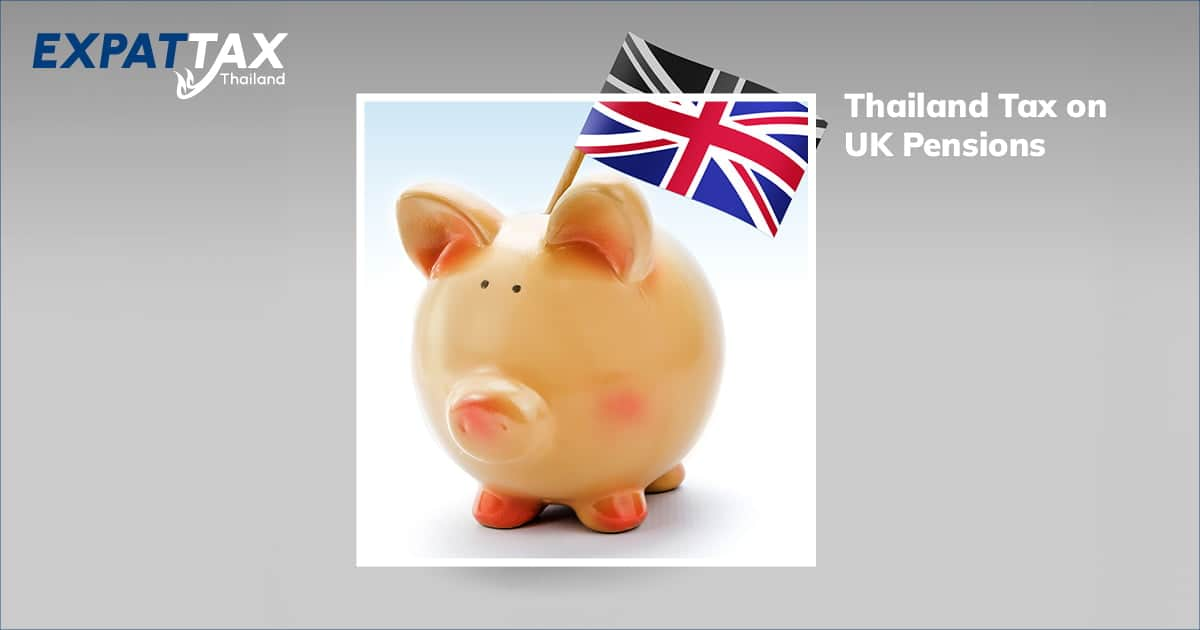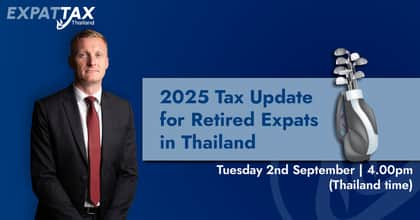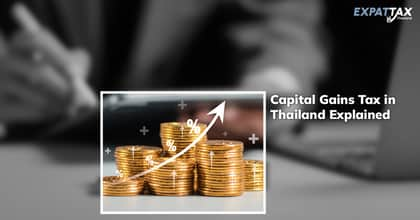
Managing UK pension taxation as an expat in Thailand can be complex, especially with the recent changes to Thai tax laws. For those living in Thailand, understanding how these rules apply to remitting pension income is crucial to avoid penalties and ensure full compliance. This article aims to guide you through the key aspects of UK pension taxation in Thailand, helping you make informed decisions about your financial future.
Overview of Thai Taxation on Foreign Income
In Thailand, foreign-sourced income for expatriates is taxed on a remittance-only basis. This means you are only liable for taxes on the income you transfer into Thailand. Any income earned and left outside Thailand is not subject to Thai taxes unless the work generating that income was conducted in Thailand, which could make it taxable even if not remitted.
This remittance-based system offers expatriates considerable flexibility in managing their global finances. You can strategically decide when and how much foreign income to transfer to Thailand based on your financial needs and tax planning strategies. The timing of these transfers can significantly impact your tax liabilities in Thailand, potentially reducing your overall tax burden and giving you more control over your annual tax commitments.
Understanding this system is essential for effective financial planning, enabling you to maximise your earnings while complying with Thai tax regulations. This approach also simplifies the tax process by eliminating the need to track and report global income that remains outside Thailand, easing the complexity of your tax filings.
However, it’s important to maintain detailed records of the amounts remitted to Thailand each tax year. Careful planning of these transfers can help minimise potential tax impacts, ensuring you fully leverage the benefits of this system.
Recent Changes and Announcements
In 2023, Thailand’s Revenue Department introduced significant changes to taxing foreign-sourced income, impacting individuals who qualify as Thai tax residents. These changes were formalised in the Royal Gazette on 6 October 2023, following the issuance of Departmental Instruction No. Por 161/2566 on 15 September 2023.
Under the new rules, anyone who spends 180 days or more in Thailand within a calendar year (1st January – 31st December) is considered a Thai tax resident and is, therefore, required to potentially pay taxes on any foreign income brought into Thailand during that year. This marks a shift from previous regulations, which allowed tax deferral by delaying the remittance of foreign income.
Effective 1 January 2024, foreign income remitted to Thailand by tax residents is taxable in the same year it is brought into the country. However, in line with existing double tax treaties, individuals can potentially offset their Thai tax liabilities with any taxes already paid in the foreign country, depending on the specific DTA. This adjustment emphasises the importance of carefully timing income remittances to manage tax obligations effectively.
Specific Types of UK Pensions and Their Taxation in Thailand
Understanding the various types of UK pensions is essential for expats in Thailand, as each type is subject to different tax rules when remitted. Below are the main types of UK pensions and how they are typically structured.
State Pensions
The UK state pension is a regular payment from the UK government based on an individual’s National Insurance contributions. Unlike other pensions, state pensions are generally lower in value but are still classed as ‘foreign sourced income’ and fully taxable in Thailand when remitted. There is no specific relief under the UK-Thailand Double Taxation Agreement for state pensions, making them fully assessable under Thai tax laws.
Final Salary Pensions
Final salary pensions provide are typically paid out at a fixed rate and are taxed at source in the UK. The entire amount remitted from a final salary pension in Thailand is treated as assessable income. While the tax paid in the UK can often be credited against Thai tax liabilities, the income is still subject to Thai tax.
Self-Invested Personal Pensions (SIPPs)
SIPPs are a type of pension allowing individuals to manage their retirement funds. Their flexibility enables holders to invest in a wide range of assets, including shares, bonds, and property. However, when remitted to Thailand, any income drawn from a SIPP is considered taxable under Thai law. Although some income may be taxed at source in the UK, it remains assessable in Thailand, with tax credits available for taxes already paid in the UK.
Pension Commencement Lump Sums (PCLS)
In the UK, Pension Commencement Lump Sums (PCLS) are typically tax-free lump sums and allow individuals to withdraw up to 25% of their pension pot without incurring UK income tax. However, when these lump sums are remitted to Thailand, they are not afforded the same tax-free status. Instead, PCLS are treated as taxable income under Thai law. Withdrawing a PCLC and transferring to Thailand while a Thai tax resident, will be considered assessable income and taxed accordingly. The key point for expats to remember is that even though PCLS is tax-free in the UK, it does not receive the same treatment in Thailand, potentially leading to a significant tax liability when remitted.
Annuities
Annuities are financial products that provide a steady income stream, often purchased with a lump sum from a pension pot. Payments from annuities are taxed in the UK and, like other pension income, are taxable in Thailand when remitted. The key point to note is that while UK tax paid can often be offset, the income itself must be declared and is subject to Thai taxation.
Qualified Recognised Overseas Pension Schemes (QROPS)
QROPS are pension schemes based outside the UK but recognised by HMRC. UK expats often use them to transfer their UK pension benefits abroad, potentially offering tax advantages depending on the jurisdiction. However, when QROPS funds are remitted to Thailand, they are considered taxable income under Thai law. This applies regardless of the tax treatment in the QROPS jurisdiction. The lack of a Double Taxation Agreement (DTA) between Thailand and many common QROPS jurisdictions, such as the Isle of Man, Malta or Gibraltar, means no tax credits are available, making the entire amount fully assessable in Thailand.
Qualifying Non-UK Pension Schemes (QNUPS)
QNUPS are designed to allow individuals to save for retirement outside the UK without being subject to UK inheritance tax on the funds. Like QROPS, when funds from a QNUPS are remitted to Thailand, they are treated as taxable income. The key difference is that QNUPS can be more flexible in their investment strategies and contribution limits. However, the absence of a DTA with many QNUPS jurisdictions also means that no tax relief or credits can be applied, making these pensions fully taxable upon remittance to Thailand.
Summary
While UK pension schemes like SIPPs, final salary pensions, and QROPS often offer tax advantages in the UK, these benefits do not generally apply when the funds are remitted to Thailand. In most cases, remitted pension income is fully taxable under Thai law, including sums that may have been tax-free in the UK, such as PCLS. However, there is some potential relief through Double Taxation Agreements (DTAs), which can help reduce the tax burden by offsetting taxes already paid in the UK. Understanding how these agreements work is crucial for effectively managing your pension income in Thailand.
Watch Our Webinar – Thailand Tax on UK Pensions

Double Taxation Agreements (DTAs) and Tax Credits
Understanding DTAs
Double Taxation Agreements (DTAs) are treaties between two countries that aim to prevent individuals and businesses from being taxed twice on the same income. The DTA between the UK and Thailand is designed to allocate the right of taxation between the two countries, ensuring that income is not unfairly taxed in both jurisdictions.
A common misconception about DTAs is that they eliminate the possibility of being taxed in both countries. In reality, DTAs typically divide the taxing rights, allowing both countries to tax certain types of income, with provisions in place to avoid double taxation. For instance, pension income may be taxed at source in the UK and Thailand when remitted, but the DTA allows for mechanisms like tax credits to reduce the overall tax burden.
Applying Tax Credits
Tax credits are a key feature of DTAs that help individuals avoid paying tax on the same income twice. When you have already paid tax on your pension income in the UK, you may be eligible to claim a tax credit in Thailand for the amount paid. This credit can be applied against your Thai tax liability, reducing the tax you owe in Thailand.
For example, if your UK some of your pension income is taxed in the 20% bracket in the UK and you remit this income to Thailand, where the applicable tax rate is higher, you can use the tax paid in the UK as a credit to offset part of your Thai tax liability. However, it’s important to understand that tax credits do not eliminate the need to file, or pay tax in Thailand entirely; they simply potentially reduce the overall tax burden, ensuring that you are not taxed on the same income twice to the full extent.
Tax Implications for Other Assets and Income
Other Remitted Income
In addition to pension income, other types of income, such as investments, property sales, rental income, and offshore bonds, may also be subject to Thai taxation when remitted. Any capital gains from these sources are considered taxable income in Thailand. For example, if you sell property in the UK or gain from investments and then transfer these funds to Thailand, you must calculate the capital gains portion of the remitted amount. This capital gain is treated as assessable income and will be taxed according to Thai law.
It’s important for pensioners to be aware that their tax liabilities in Thailand could extend beyond just their pension income. Any significant remittance of income from other sources, including dividends or interest from investments, could trigger additional tax obligations.
Special Cases
There are specific scenarios where the tax treatment of remitted funds differs. For instance, cash transferred to Thailand from previous tax years—when you were not a Thai tax resident—is generally not taxable. This means that if you accumulated savings before moving to Thailand, remitting these funds after becoming a Thai resident would not attract Thai tax.
However, other forms of income, such as gifts, loans, and inheritances, can have different tax implications. Gifts and loans, while not typically considered income, could be subject to complex tax rules depending on the circumstances. Inheritances are generally not taxable when remitted to Thailand, but it’s crucial to understand the specific criteria to ensure compliance.
While this section may not focus on your financial planning, it’s important to consider that remitting any income or assets to Thailand can create tax liabilities. Pensioners, in particular, should take a comprehensive view of all their financial transfers to avoid unexpected tax burdens.
Need to Know More About the UK-Thailand DTA?
Watch our recent webinar below.

Long-Term Resident (LTR) Visa: A Tax-Efficient Option
For expatriates living in Thailand, the Long-Term Resident (LTR) Visa offers a unique opportunity to minimise tax liabilities. This visa is designed for high-net-worth individuals, retirees, and professionals who meet specific criteria, providing long-term residency and significant tax benefits. One of the key advantages of the LTR Visa is its exclusion of foreign-sourced income from Thai taxation, provided the income is remitted to Thailand in the year following its accrual.
For those who qualify, the LTR Visa could be the most effective way to avoid significant tax liabilities on remitted income. By carefully managing the timing of income transfers, LTR Visa holders can benefit from both a secure long-term residency in Thailand and a more favourable tax environment.
Expats considering this visa should evaluate their eligibility and the potential tax savings, as it may offer a more strategic approach to managing their finances while living in Thailand.
Filing Requirements and Penalties
Who Needs to File?
In Thailand, anyone who qualifies as a tax resident—typically defined as spending 180 days or more in the country within a tax year—must file a tax return if they have assessable income. This includes income remitted from abroad. For individuals, the most common threshold for remitted income that triggers the need to file a tax return is 60,000 Thai Baht per year. For married couples filing jointly, the threshold increases to 120,000 Thai Baht. For others it is THB120,000 for single filers and THB220,000 for married filers, if it is salary or other types of income. Both limits show that most people transferring in foreign sourced income will have to file regardless of which limit it is.
If you meet these criteria, you must obtain a Tax ID number from your local Revenue Department office. The process can be handled either in person or through a paid service like with Expat Tax Thailand. The timeline for filing your tax return is the same each year: the return must be submitted by the end of March or the first week of April for the previous tax year.
Penalties for Non-Compliance
Failing to file a tax return or underreporting your income in Thailand can result in significant penalties. The standard penalty for failing to file is up to 200% of the assessed tax amount.
A surcharge of 1.5% per month will also be applied to the overdue tax until it is paid. More severe cases, such as intentional tax evasion or fraud, can lead to criminal charges, with penalties including up to one year of imprisonment and fines up to 200,000 Thai Baht and affecting Visa and residency status.
Given these stringent penalties, it’s crucial for anyone remitting income to Thailand to ensure they comply with all filing requirements. Seeking professional advice to calculate and report income accurately can help you avoid these penalties and ensure that your tax affairs are in order.
It May Not Be as Bad as You Fear
While the prospect of Thai taxation on remitted income may seem daunting, the reality is that with proper planning, your tax burden might be lower than expected. Let’s look at some real-life examples to illustrate how this works.
Case Study 1: UK SIPP and State Pension
Consider a 65-year-old individual who remits income from a UK SIPP and a state pension to Thailand. They bring in £5,000 from the SIPP and £9,000 from the state pension, with an additional £4,000 from an annuity, totalling £18,000 (approximately 800,000 Thai Baht).
Although this income is taxable in Thailand, the tax credits available for UK taxes already paid mean that the individual’s Thai tax liability may be relatively modest. In this case, the Thai tax owed might be less than what has already been paid in the UK, potentially resulting in no additional tax being due in Thailand, which means they have to file a Thai tax return, to claim the UK tax credits, but don’t have a punitive tax bill.
Case Study 2: QROPS and No UK Tax
In another example, a 67-year-old retiree remits income from a QROPS and a UK state pension, totalling £49,500 (around 2.3 million Thai Baht). Since the income from the state pension is below the UK tax threshold, no tax is paid in the UK. However, because the QROPS is held in a jurisdiction without a Double Taxation Agreement with Thailand, the full amount is subject to Thai tax. Even so, after applying Thai allowances and deductions, the overall tax rate could be around 14%, which might be lower than expected.
Case Study 3: Complex Assets and Remittances
A more complex case involves a 55-year-old individual with a QNUPS, a final salary pension, and an offshore investment bond. They plan to remit £108,000 to Thailand, including £40,000 in cash from previous tax years, £20,000 from the QNUPS, and £28,000 from the final salary pension. Although this seems substantial, the cash from previous years is not taxable, and only the capital gains portion of the offshore bond is taxed. The total assessable income in Thailand is reduced to £24,000, and after applying available credits and deductions, the overall tax rate is approximately 9%.
Summing Up
Thai taxation on remitted income doesn’t have to be as overwhelming as it might seem. With careful planning, a clear understanding of the rules, and the right professional support, you can effectively manage your tax obligations and avoid unexpected liabilities. As you navigate your financial future in Thailand, consider the importance of expert guidance to ensure that you are fully compliant while optimising your tax position.
Importance of Professional Advice
Why Seek Expert Help?
Navigating the complexities of Thai taxation, especially when dealing with remitted income from abroad, can be challenging. The rules are intricate, and missteps can lead to unnecessary tax liabilities or even penalties. Consulting with a tax professional who understands both UK and Thai tax laws is essential to ensure that you are fully compliant while also minimising your tax burden.
Expat Tax Thailand offers services designed to help expatriates manage their tax obligations efficiently. Whether you need assistance with tax planning, filing returns, or understanding how Double Taxation Agreements (DTAs) can benefit you, our team of experts guides you every step of the way. You can confidently manage your finances and filing obligations by seeking professional advice to stay compliant and maximise your tax outcomes.
Contact Us for a Free Consultation
Understanding and managing your tax obligations in Thailand can be complex, but you don’t have to do it alone. At Expat Tax Thailand, we specialise in helping expatriates like you navigate the intricacies of Thai taxation. Whether you’re dealing with pensions, investments, or other remitted income, our team is here to provide expert guidance tailored to your unique situation.
Ready to take control of your tax planning? Contact us today for a free, no-obligation consultation. Our experts will work with you to assess your tax liabilities, explore potential savings, and ensure you fully comply with Thai tax laws.
More detailed 1-1 consultation needed? If you have specific questions to answer that require a paid consultation, you can arrange a call here, either in person or online.
Ready to file? Here is more information on how to file your taxes remotely with Expat Tax Thailand


